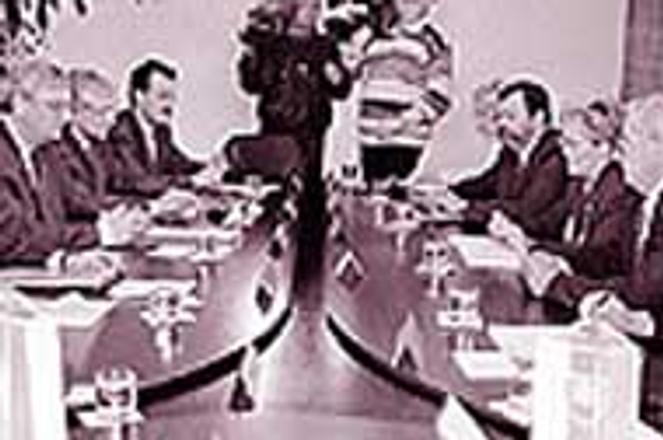At a November 18 meeting, the Russians gave the bad news to the Slovaks.photo: Marek Velček
Having declared a pro-western economic stance for more than a year, the Dzurinda government is now faced with a much lower than expected payment by Russia in settlement of its debt to Slovakia. Slovak Finance Minister Brigita Schmögnerová and Russian Deputy Finance Minister Vladimír Volkov agreed on November 18 in Bratislava to a settlement of only $13 million for 1999, far below the $150 million the Slovak side had expected, while another $40 million will be paid off in the year 2000.
The Russians cited an August agreement with the so called Paris Club - a group consisting of most of the world's developed countries including France, Germany and the United Kingdom, who are Russia's largest creditors - which allowed Russia to defer principal payments and instead pay only the interest on its debts to club members in 1999 and 2000. "We [the Russian government] simply cannot pay more to Slovakia than we pay to members of the Club," said Alexander Mazilov, a business advisor for the Russian federation in Slovakia.
Schmögnerová agreed that Russia's accord with the Paris Club had affected also the lower amount offered to Slovakia, but added that she saw a political motive in the Russian decision as well. "Apart from the results of the Paris club talks and the economic crisis in the Russian market, I can also see this factor [pro-western politics of the current Slovak government] present," she said.
The fact that Russia agreed to pay larger sums to the government of Vladimír Mečiar but has now tightened money flows to the current government, has been cited by analysts as proof of Russia's displeasure with Slovakia's more pro-western orientation. Under Mečiar, Slovakia was excluded from first-round integration to the EU and NATO, but maintained cordial political ties with Russia and signed several long-term contracts in 1997 committing Slovakia to buy Russian gas.
"From Russia's point of view, it seems like some kind of pressure or revenge on the Dzurinda government for its policy," said Marek Jakoby, an analyst with the economic think tank MESA 10. "If Dzurinda's western orientation wasn't so clearly defined, the government would probably see much more than $40 million in the state treasury."
For his part, Mazilov didn't see any political implications. "We [Russia] don't mix politics with economic issues," he said. Mazilov explained that Russia had been delivering goods to Slovakia to clear its debt without a contract since 1997.
Russia has been waiting to sign a ministerial contract that spells out the volume and structure of goods to be imported into Slovakia for the debt settlement. "The signing of this contract is key for us and it will help to overcome the problems we are facing now," said Mazilov. "However, we can see a lack of interest on the Slovak side to agree on a rational solution."
The Russian debt, dating back to the time of the Soviet Union, totalled $1.2 billion in 1991, of which about $750 million has since cleared. The Slovak government had calculated revenues from the settlement of Russian debt for the year 2000 at $150 million, based on similar payments by Russia over the past four years.
The state owned power utility Slovenské Elektrárne was appointed to clear $150 million between 1999 and 2001 by receiving raw materials, including imports of nuclear fuel, black coal and electricity and the export of spent fuel. But nothing has been exchanged so far this year.
Mečiar's former government negotiated much larger sums of the debt than the Dzurinda government has managed. In 1995 the Russians wiped $167 million off their debt, in 1996 $253 million, in 1997 $117 million and in 1998 $132 million.
However, according to Jakoby, most of the goods that Russia has delivered to Slovakia as part of the debt settlement were overestimated in price. "We could normally get many of these same products for cheaper prices," he said.
Some of the methods Russia has used to pay Slovakia back have also come under criticism. Three expensive military aircraft were given to Slovakia, while the flight of the first Slovak astronaut to outer space was paid for by the Russians. The Slovak air carrier Slovenské Aeolínie was provided with Tupolev aircraft.
František Šebej, chairman of the government's committee for European integration, said that only the Russian side had profited from the exchange. "These negotiations only spoil the good name of Slovakia abroad," he said. According to Šebej, the economic situation in Russia makes it unlikely that a small trading partner like Slovakia will be able to generate enough leverage to force the Russians to pay the remaining debt in full.


